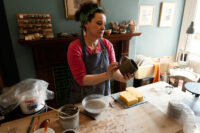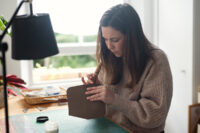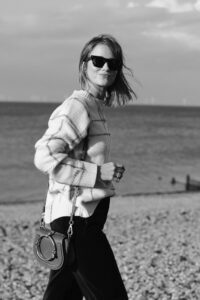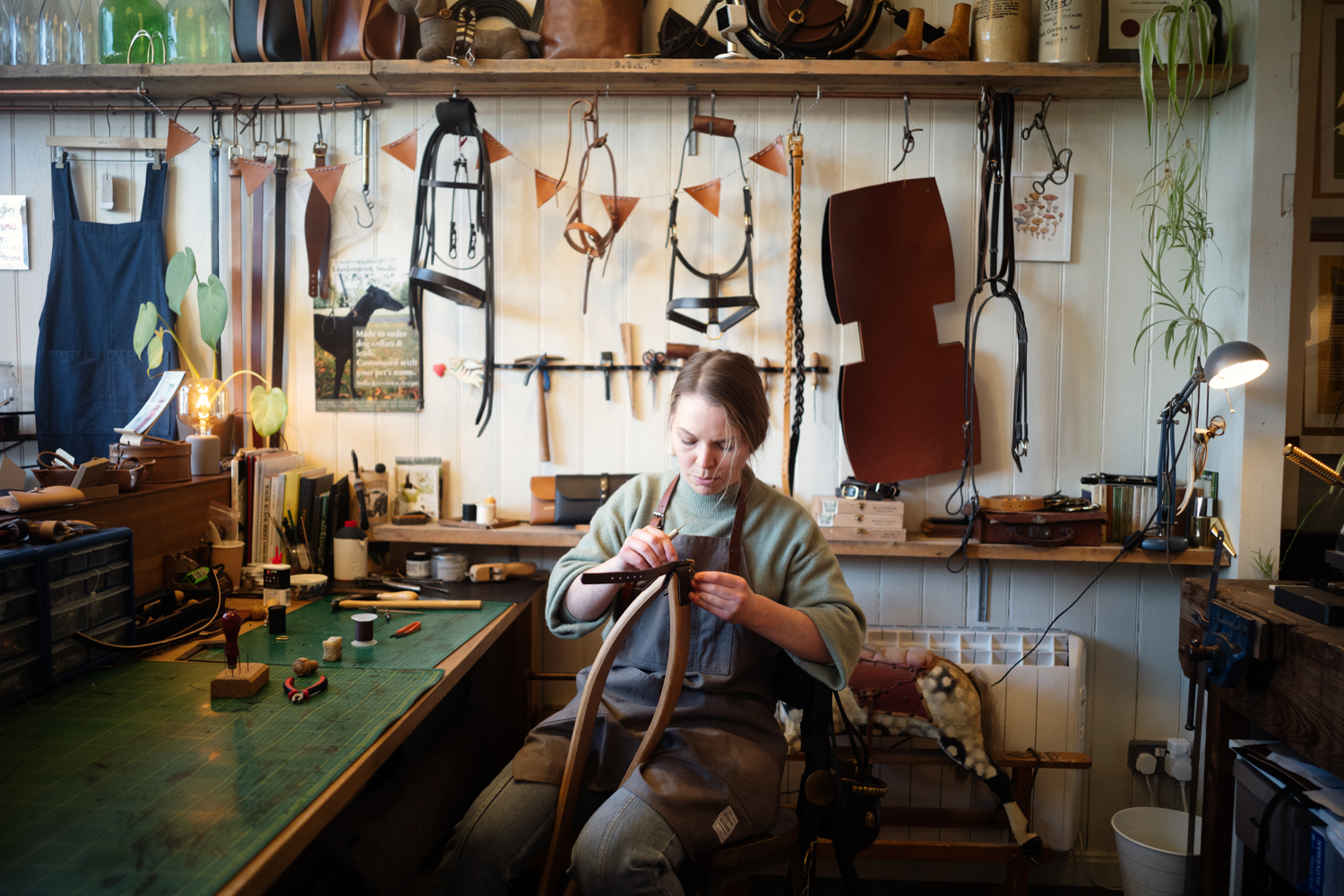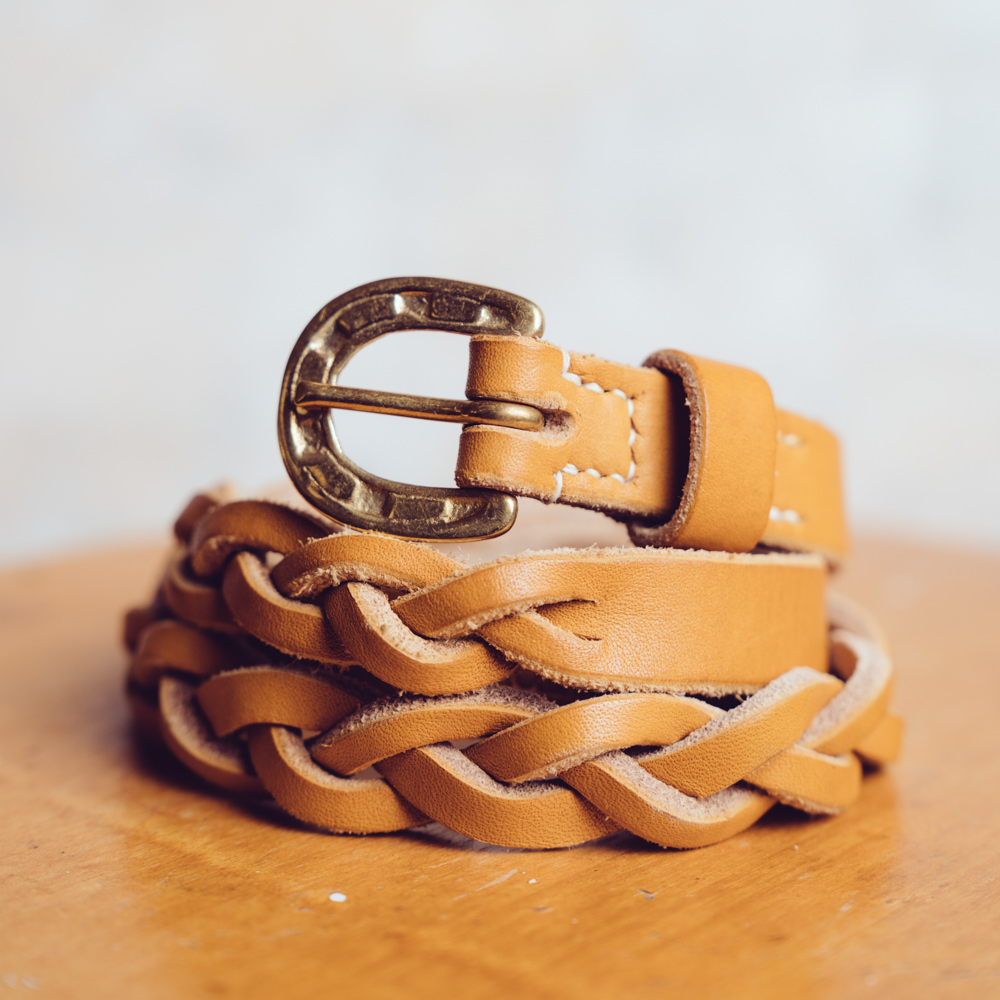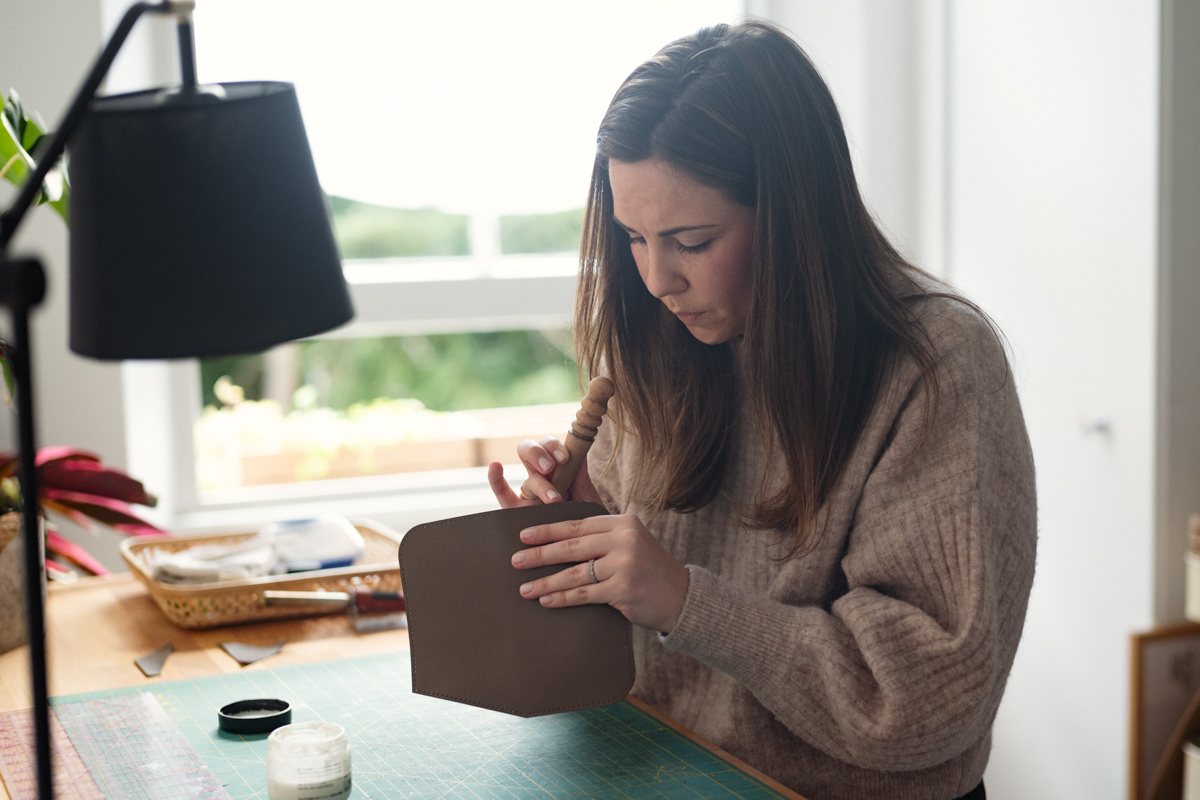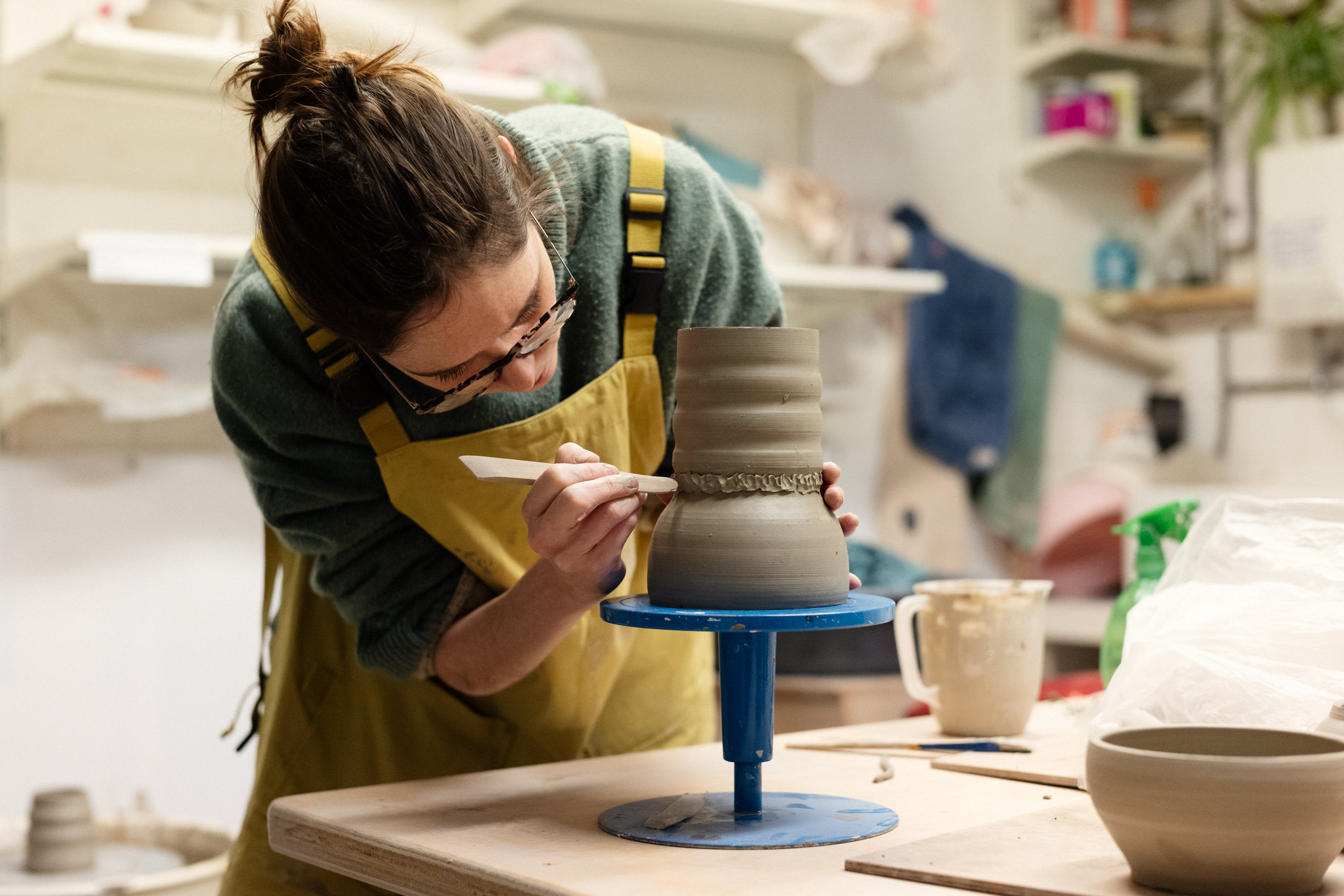Meet Catherine Cullen: A Visionary in Leather Craftsmanship and Artistic Expression. Catherine’s mastery extends beyond traditional leatherwork, pushing boundaries to create stunning and functional pieces. With a meticulous eye for detail and a passion for quality, each creation tells a unique story. Drawing inspiration from nature and heritage, Catherine’s designs evoke a sense of timeless elegance and authenticity. Join us as we delve into Catherine’s artistic journey and immerse ourselves in the captivating world of her remarkable leather craftsmanship. Stay tuned for exciting updates and future endeavours as Catherine continues to redefine the art of leather-making.
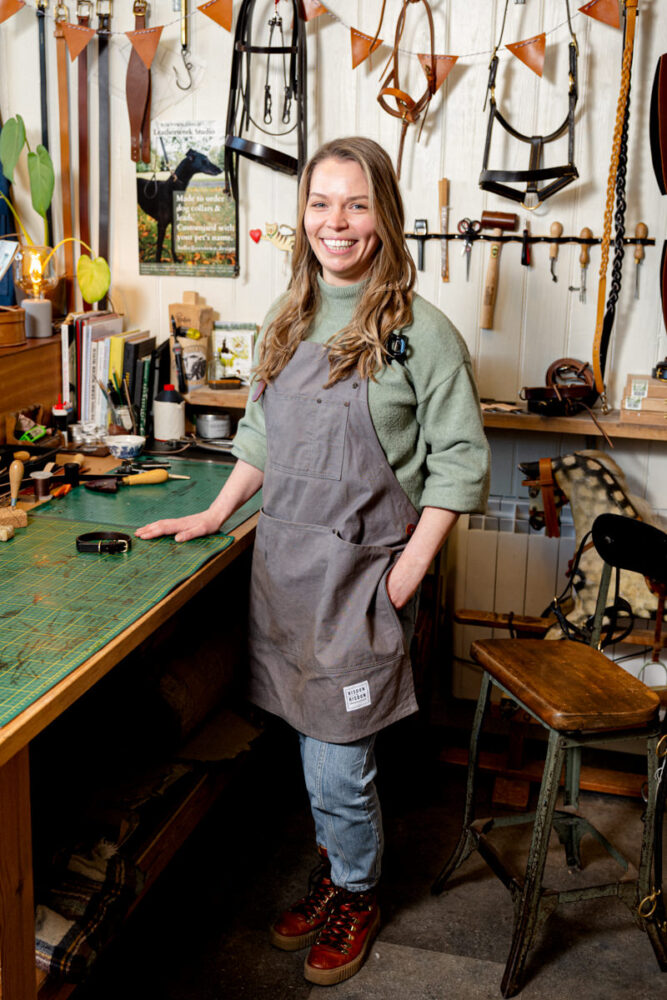
Catherine Cullen
My journey in leather work and the inspiration behind Roxtown Design began with a passion for horses, my need to do something creative and a love for the natural beauty of our local landscapes. I am inspired by the rich history of leatherwork and saddlery techniques that have been passed down through generations. When I first picked up an ‘Introduction to saddlery’ course, I happened to be at the Metropolitan Museum and I saw an image depicting Egyptian leather workers and instantly recognised many of the tools in my own kit today. This was in 2018, I still have this photo on my phone!
Traditional saddlery techniques and the picturesque landscapes of Britain and Ireland are a core inspiration and influence of the Roxtown brand. This stems from my youth riding horses across wild Irish landscapes, followed by a love of nature, landscape and form – I studied Geology at university spending lots of time in the highlands of Scotland. I very much draw inspiration from the raw and rugged beauty of the countryside, natural colour schemes, the elegance of equestrian culture, and the durability and functionality required in outdoor pursuits.
My attention to detail, I am my own worst critic! I believe I am practical at creating designs, the products I sell are originally made for myself, something that I have a need for. Each of my handmade accessories possess a unique blend of traditional techniques and contemporary design, that is then put to the test. I like to think my products stand out due to their quality, durability, and timeless appeal.
When training in saddlery time is spent teaching on how to carefully select materials suitable for the equipment you are making. From this you learn a lot about where to source local for the very best leather, hardware and tools, and how to recognise when a material is not up for the job. Particularly with leather, I select suppliers who share commitment to ethical practices and ensure that materials are of highest standard – British leather is known for its quality, it’s world renowned. By sourcing locally, this supports British artisans and minimises our environmental impact, while guaranteeing the finest quality of goods for customers.
“I still pinch myself when I make a sale, knowing that someone has valued my work and design brings real joy and satisfaction.”
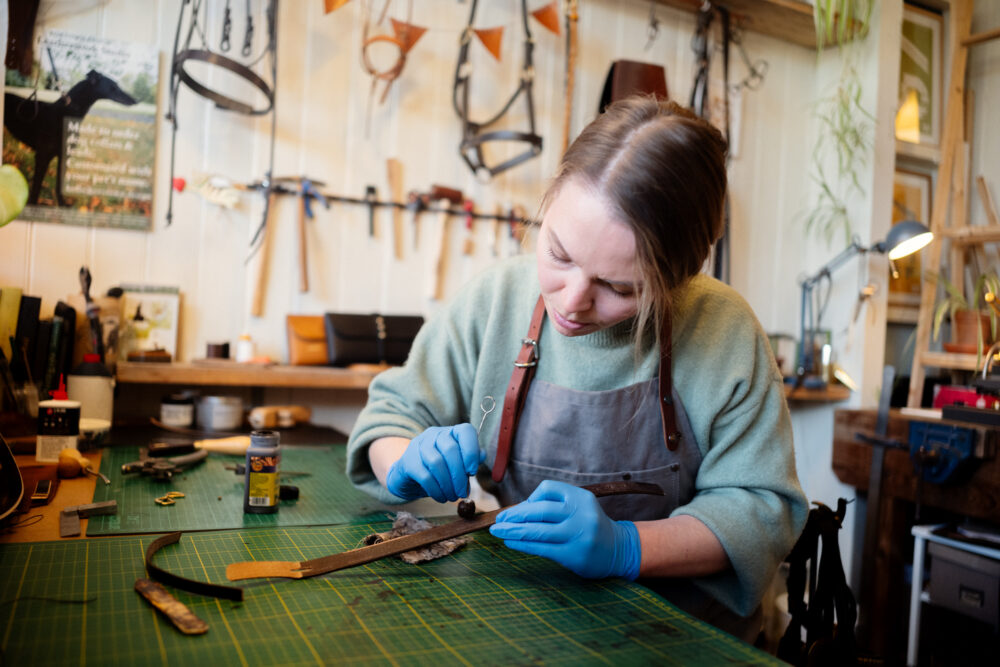
I take pride in crafting accessories that are durable. Just ask my dog, Bramble, his lead is also his favoUrite tug of war toy. This is very much achieved through a combination of traditional saddlery craftsmanship and the use of high-quality materials. Using time-tested saddlery methods reinforces stress points and helps enhance the durability and longevity of products. Of course, it’s important to flag that leather is a natural product and to get the best run of an item, feeding the leather with natural wax balms can keep it healthy and maintain strength.
The process of creating a leather accessory often begins with the need of a product, and me thinking, “I could really use… A large leather tote to carry everything from my laptop to my dog”!
From here I’ll do some research to get inspired for the product, sketching out designs, looking at different tack and equestrian equipment in search for interesting techniques I could apply. I then move on to pattern making from card. Sometimes this step takes a few attempts to get right! It is important to carefully consider the specification, functionality and aesthetics of each piece before applying it to leather. Once I’m happy with the patterns, I’ll make up a prototype to test. I use the pattern and hand-cut with a saddlers knife from the hide of leather. Attention to detail is important here regarding unique characteristics, such as where a scar or stretch marks might appear, where they will most complement the product or will they cause stretch and hinder the product. Once all pieces have been cut and prepped, I’ll put it together, saddle stitching, riveting and burnishing, before giving it a final treatment and buff. Then it’s time to test and tweak!
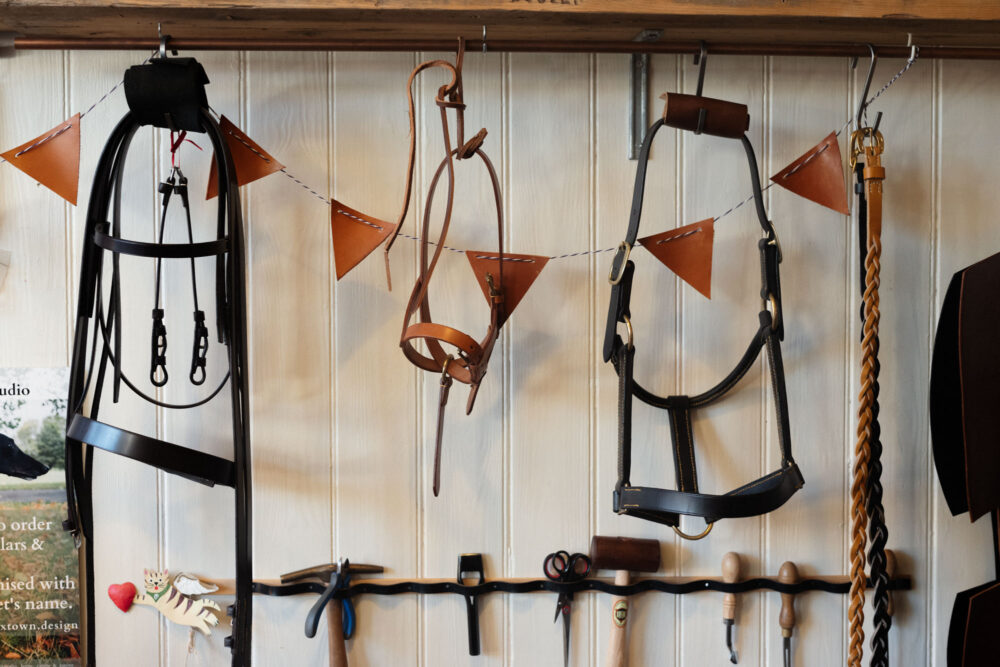
Safety, comfort and functionality are the primary consideration, this includes selecting the right materials to incorporate adjustable features, and striving to create products that are strong, functional and above all, safe! It takes years to become a master in the trade, I’m still very much training in this field, but a lot of the techniques I have learnt filter into my accessories, giving a subtle nod to equestrianism.
By combining timeless techniques with clean lines and functional details, I create leather accessories that resonate with customers seeking a blend of heritage and contemporary style.
This is best reflected in my first collection that hails to Irish landscapes through the product eg Tullaugh Pouch, Urris tote. The tools, materials and skills to make each item are derived from history. The design, a timeless piece for the modern day.
My initial response would be – do you need it, is it practical, will you use it?
A huge part of Roxtown is that I don’t have any stock or products ready to ship. Everything is made to order, with the exception of a small selection of pre-made work that Vigour and Skills have for events. Working this way is important as it minimises waste. Again by sourcing materials in Britain and using ethical leather suppliers that prioritise animal welfare and are meat industry byproduct, helps reduce environmental impact.
This is a tricky one to answer, I have had so many great experiences working in this field, it’s hard to pick! I still pinch myself when I make a sale, knowing that someone has valued my work and design brings real joy and satisfaction. I’ve also had great experiences in my growth as a maker from starting at a kitchen table to having my own studio in London, to making props for theater and tv to exhibiting at London Craft Week with Vigour and Skills.
Roxtown Design has been quiet of recent as I’ve moved to Edinburgh and am currently finding my crafting support system in a new city. However I do aspire to continue to grow the brand. I’m currently working on a new product range and in the future, I’d like to collaborate with like-minded artisans such as furniture makers, and of course, continue my training in saddlery!


